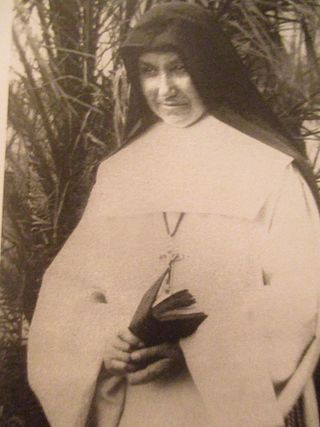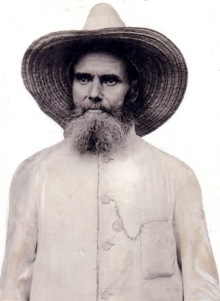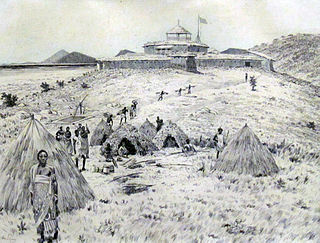
Kalemie, formerly Albertville or Albertstad, is a town on the western shore of Lake Tanganyika in the Democratic Republic of the Congo. The town is next to the outflow of the Lukuga River from Lake Tanganyika to the Lualaba River.

Lieutenant-general Baron Jules-Marie-Alphonse Jacques de Dixmude, often known as General Jacques, was a Belgian military figure of World War I and colonial advocate.
The Apostolic Vicariate of Tanganyika was a Catholic apostolic vicariate of the White Fathers missionary order at first centered on the mission of Karema in what is now Tanzania, that included parts of what are now Rwanda, Burundi, Democratic Republic of the Congo, Zambia and Malawi. As the number of missions, schools and converts grew, different regions became distinct vicariates covering portions of the original territory.

The Congo–Arab War was fought in Central Africa between the forces of Belgian King Leopold II's Congo Free State and various Zanzibari Arab slave traders led by Sefu bin Hamid, Tippu Tip's son. It was a proxy war in eastern Congo from 1892 to 1894, with most of the fighting being done by native Congolese, who aligned themselves with either side and sometimes switched sides.

Victor Roelens was a Belgian priest who became Vicar Apostolic of Upper Congo in 1895, and remained the premier bishop in the Congo Free State, then the Belgian Congo, until he retired in 1941.

Alexandre Delcommune was a Belgian officer of the armed Force Publique of the Congo Free State who undertook extensive explorations of the country during the early colonial period of the Congo Free State. He explored many of the navigable waterways of the Congo Basin, and led a major expedition to Katanga between 1890 and 1893.

Léon-Antoine-Augustin-Siméon Livinhac, M.Afr. was a Catholic priest who established the church in what is modern Uganda and became head of the White Fathers. He oversaw a major expansion of the missionary society that coincided with the European colonial annexation of most of Africa.

The Missionary Sisters of Our Lady of Africa, often called the White Sisters, is a missionary society founded in 1869 that operates in Africa. It is closely associated with the Society of the Missionaries of Africa, or White Fathers.

Léonce Bridoux, M. Afr. was a Catholic missionary of the White Fathers who became the Vicar Apostolic of Tanganyika.

Mpala is the location of an early Catholic mission in the Belgian Congo. A military station was established at Mpala on the shores of Lake Tanganyika in May 1883. It was transferred to the White Fathers missionaries in 1885. At one time it was hoped that it would form the nucleus of a Christian kingdom in the heart of Africa. However, after a military expedition had to be sent to protect the mission from destruction by local warlords in 1892, civil control returned to the Belgian colonial authorities. The first seminary in the Congo was established at Mpala, and later the mission played an important role in providing practical education to the people of the region.

Émile Pierre Joseph Storms was a Belgian soldier, explorer, and official for the Congo Free State. He is known for his work between 1882 and 1885 in establishing a European presence in the regions around Lake Tanganyika, during which he supported the White Fathers missionaries and attempted to suppress the East African slave trade. He is remembered for his ruthless fight against slavery and the capture and subsequent execution of the slave trader Lusinga.

Léopold Louis Joubert was a French soldier and lay missionary. He fought for the Papal States between 1860 and 1870 during the Italian unification, which he opposed. He later assisted the White Fathers missionaries in East Africa and played an important role in the suppression of the slave trade between 1885 and 1892. He married a local woman and settled by the shore of Lake Tanganyika, where he lived until his death at the age of eighty five.
Muhammad bin Khalfan bin Khamis al-Barwani, commonly known as Rumaliza, was an Arab trader of slaves and ivory, active in Central and East Africa in the last part of the nineteenth century. He was a member of the Arabian Barwani tribe. With the help of Tippu Tip he became Sultan of Ujiji. At one time he dominated the trade of Tanganyika, before being defeated by Belgian forces under Baron Francis Dhanis in January 1894.
Mulwewa was a mission founded by White Fathers missionaries on the west side of Lake Tanganyika, in what is now the Democratic Republic of the Congo. It is at Massanze, near Uvira.

Karema is a settlement in Tanzania, on the east shore of Lake Tanganyika, once the location of a White Fathers mission station.

Adolphe Lechaptois, M. Afr. was a priest of the White Fathers missionary society who was Vicar Apostolic of Tanganyika from 1891 until his death in 1917, in what is now Tanzania. He took responsibility for the vicariate at a time of great danger, when the missions were insecure havens for people fleeing slavers. As the country settled down, he oversaw expansion in the number of missions and schools. He was the author of a book on the ethnography of the local people that won a prize from the French Société de Géographie.
Mathurin Guillemé was a Catholic White Fathers missionary who was Vicar Apostolic of Nyassa in today's Malawi from 1911 until his resignation in 1934.
The Belgian Anti-Slavery Society was a 19th-century organization, with the goal of putting an end to the Arab slave trade in the African continent. The Belgian Anti-Slavery Society was founded in 1888, mainly by catholic intellectuals, led by count Hippolyte d'Ursel. The founders were inspired by the preaching of Charles Lavigerie, a French Cardinal, held at the Cathedral of St. Michael and St. Gudula in August 1888. By January 1889 the society counted 700 members and had a working capital of 300.000 francs at its disposal. The abolitionist ideology of the Anti-Slavery Society was, however, closely linked with imperialism. From 1890 to 1899 the Société antiesclavagiste de Belgique organized and funded four military expeditions, sent to fight the Arab/Zanzibari slavers of the eastern Congo Free State regions.

Augustin Prosper Hacquard was a French missionary who became Apostolic Vicar of Sahara and Sudan in 1898. After several years in Algeria, including a short period as head of the Armed Brothers of the Sahara, he was appointed to the French Sudan, the newly acquired territories along the Niger River to the east of Senegal, where he established several mission stations. The missionaries founded several villages, where they settled former slaves.
Adrien Atiman was a Catholic catechist and medical doctor.














